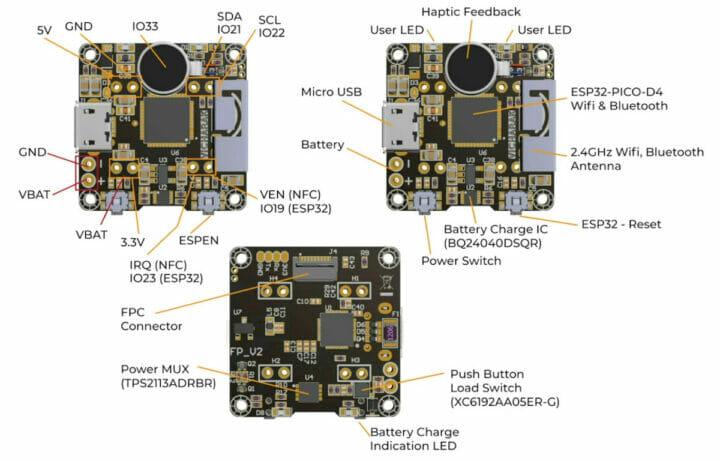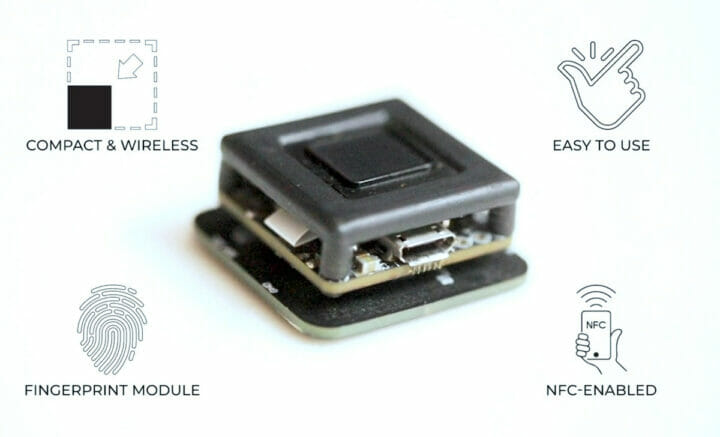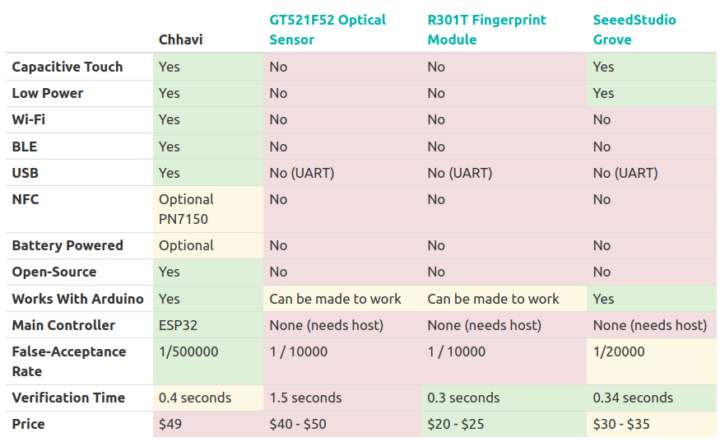Chhavi is a compact, wireless, touch-capacitive fingerprint sensor based on ESP32 WiFi and Bluetooth SoC that is offered with optional NFC connectivity and a battery.
The Arduino programmable fingerprint sensor is equipped with Fingerprints‘ FPC BM-Lite fingerprint capacitive biometric sensor that’s much more compact and power-efficient than traditional optical fingerprint sensors.
- SiP – ESP32-PICO-D4 system-in-package with ESP32 dual-core processor @ 240 MHz, 4 MB SPI flash
- Fingerprint sensor
- FPC BM-LITE Module with 99% accurate fingerprint sensing
- Sensor matrix: 160 x 160 pixels
- Number of pixels: 25,600 pixels
- Active sensing area: 8 x 8 mm
- Features – Automatic finger detection, one-to-one verification mode
- Durability – 10 million finger placements
- Connectivity
- Display – FPC connector for display
- USB – 1x Micro USB port for power/charging, and debugging via CP2102 USB-to-UART converter
- Misc – Power switch, reset button, vibration motor for haptic feedback, 2x user LEDs
- Power Supply
- 5V via micro USB port
- Support for 250 – 500 MAh LiPo batteries
- 600 mA, 3.3 V LDO regulator
- ESD protection, over-voltage, over-current protection for USB
- Dimensions – 26 x 26 x 9 mm (without battery)
 The company behind the project, Vicharak, will provide resources for Chhavi on Github. At this time, the repository only containing an Arduino sketch to display the fingerprint live data in a web browser. The company will also release the Arduino library, and is working on a library compatible with the ESP-IDF framework as well.
The company behind the project, Vicharak, will provide resources for Chhavi on Github. At this time, the repository only containing an Arduino sketch to display the fingerprint live data in a web browser. The company will also release the Arduino library, and is working on a library compatible with the ESP-IDF framework as well.
Some of the use cases for Chhavi ESP32-based fingerprint sensor include signing in to a desktop computer, unlocking a password manager, implementing door locks and other physical security controls, attendance management systems, etc…
Vicharak has just launched Chhavi on Crowd Supply, which happens to be their second project on the crowdfunding platform after Maypole ESP32 wireless storage dongle. There are four rewards between $49 and $69 depending on the NFC and battery options adding $10 each. Shipping adds $8 to the US, and $20 to the rest of the world, and backers should expect their rewards to be shipped by February 2022.
Pricing is in line with other fingerprint solutions for makers, such as PiFinger Fingerprint HAT for Raspberry Pi, and one advantage is that a microcontroller, namely ESP32, is already included so a host system is not needed contrary to many other solutions as illustrated in the comparison table below.

Jean-Luc started CNX Software in 2010 as a part-time endeavor, before quitting his job as a software engineering manager, and starting to write daily news, and reviews full time later in 2011.
Support CNX Software! Donate via cryptocurrencies, become a Patron on Patreon, or purchase goods on Amazon or Aliexpress







While the technical specs look good compared to others, let me remind that biometry is always the wrong response to authorization, as you can’t even temporarily (voluntarily or not) transfer your access without losing your finger ( http://news.bbc.co.uk/2/hi/asia-pacific/4396831.stm ), and the wrong response to authentication as you cannot revoke your fingerprints once they’ve been duplicated ( https://www.theguardian.com/technology/2014/dec/30/hacker-fakes-german-ministers-fingerprints-using-photos-of-her-hands ; https://citeseerx.ist.psu.edu/viewdoc/download?doi=10.1.1.100.8172&rep=rep1&type=pdf ).
I’m sorry for password haters but this remains the only thing that’s really depending on your will and that you and only you can adjust based on the situation.
I’ve never used the fingerprint scanner on my phone for that reason.
If the system is offline or within a local network only, it might not be as big of a problem.
As per my opinion, this doesn’t matter to small people like us, like seriously??? Yes hackers will gain a lot by hacking into some big businessman or big politician, do you even know how much it will cost (money, tech, time, efforts) to convert a fingerprint from just an image that can be put on the reader…, well it is not like they will attack you or anyone like us small peoples (yes privacy mean similar for everyone), also do you think your home lock is safe?? your physical keys are way easier to copy compare to hacking your digital device using fingerprints from the image.
I am not a password hater or hacker fan, I just found your comment/thoughts on this thing are biased so I am just placing my views here.
> As per my opinion, this doesn’t matter to small people like us, like seriously
This is exactly the type of thinking that stupid security mechanisms rely on. It’s not a matter of being “small people” or not, it’s a matter of what it brings to the other party. That’s for example how we ended up with millions of IoT devices and routers being the main source of DDoS today: “who cares about my small home network, they want to access my printer perhaps?”. No, they’re just adding it to the collection of hacked devices they’re hiring to attack the world.
The day you’re aggressed at an ATM by someone asking for the pincode of your credit card and checking that it works before leaving with it, you’ll be very happy to know that he doesn’t need to chop your thumb to use it.
Security is risk management. You must always be able to decide to give up to preserve more important assets if needed. With biometry you cannot give up, you’re locked into the system.
In addition, and to finish the “small people” aspect. You don’t know what final product such solutions result in. It can be used to unlock hotel room doors or the safe in the room for example and be really worth attacking to target specific people. Some say it only costs $500 on average to copy a fingerprint. In hotels it’s interesting because often you find it on the door knob 🙂
So you are walking around with your £200 smartphone and a thief wants it. He notices the model has finger print I’d reader. How safe is your finger?
People have been killed for less. Go check history.
So what you mean is, you will be ready to sacrifice your finger (let robber chopped it off) instead of giving password, hahaha, its not humanly possible, anyone will be ready to share password,money or literally any demand on gun point or chopping any body part warning.
about fingerprint copy, who provides fingerprint copy from hand image(picture/camera picture)? please share details.
> So what you mean is, you will be ready to sacrifice your finger
I’m saying exactly the opposite: with a password, I have the choice to give it if I feel the situation gets serious enough. I can’t decide to give up my fingerprint and if the guy wants it he can have it at the cost of my finger.
> who provides fingerprint copy from hand image
It’s up to you. Just out of curiosity I made the experience of taking a random fingerprint from google images and laser-engraving it on a plastic eraser. That leaves me with a thin relief film that would be worth testing. Others have used different approaches in the past, such as silicone on wax.
Would be cool NFC reader was compatible with the “Home Assistant Tags” and “Tag Reader for Home Assistant” projects based on the ESPHome firmware:
https://www.home-assistant.io/blog/2020/09/15/home-assistant-tags/
https://github.com/adonno/tagreader
Happy there are no p*nis sensors yet.